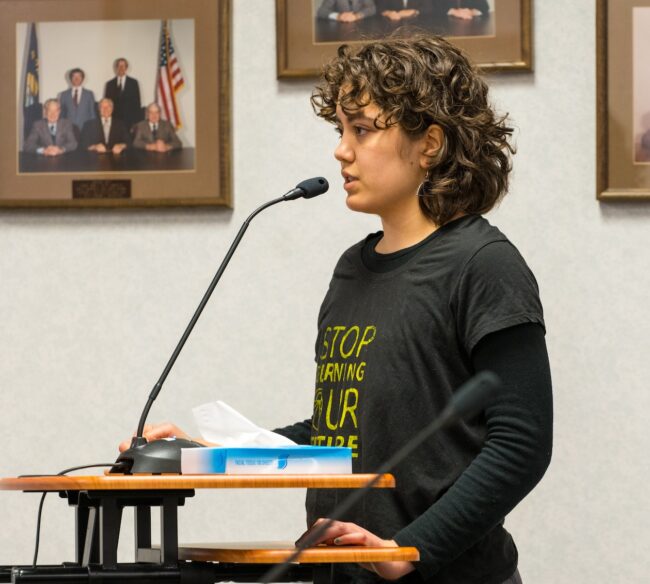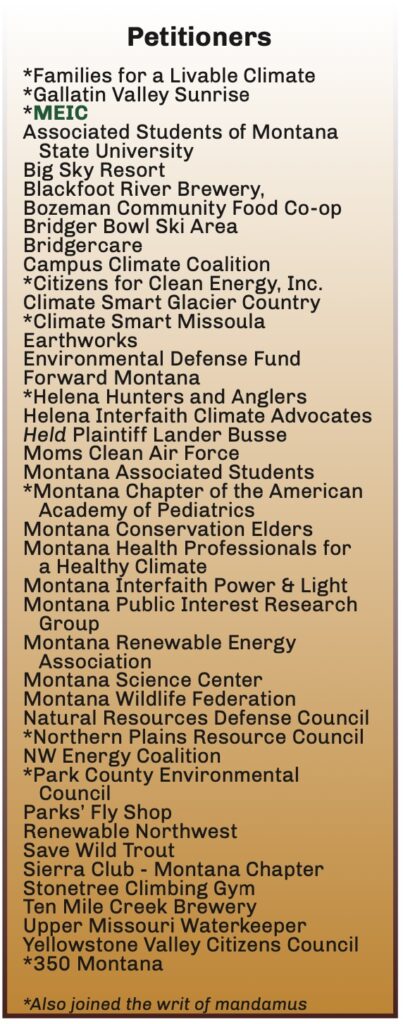
By Nick Fitzmaurice
MEIC continues to bring its concerns regarding climate change to the doorstep of the Montana Public Service Commission (PSC). With direct regulatory oversight of monopoly utilities such as NorthWestern Energy — whose fossil fuel infrastructure drives Montana’s climate-altering pollution — the elected PSC has the potential to be the most impactful body in the state to mitigate the climate crisis. The PSC is also constitutionally obligated to do so. Given our current PSC’s history of bowing to NorthWestern’s fossil fuel interests, it is disappointing but expected that the PSC would do everything in its power to resist complying with this obligation. However, MEIC did not expect the PSC to so blatantly disregard Montana’s legal requirements.

Eva Molina speaks on behalf of Gallatin Valley Sunrise at the PSC petition hearing in February. Photos by Floating Leaf Studios.
The Montana Legislature has granted the PSC broad rulemaking authority to implement its duties, such as considering climate risk, and has empowered citizens to request rule promulgation by state agencies. So, MEIC, along with key partners Families for a Livable Climate and Gallatin Valley Sunrise, convened a group of over 40 Montana businesses and organizations to file a formal rulemaking petition with the PSC in February. This petition requests that the agency formalize a consideration of climate impacts into its procedural rules for regulating Montana gas and electric utilities. This petition also asserts that the PSC must abide by Montana’s Constitutional right to a clean and healthful environment, which includes a healthy climate for present and future generations.
MEIC’s March Down to Earth publication details the PSC’s obligation to consider climate impacts in light of similar considerations from government entities in other states as the most equitable approach to protecting consumers from rising utility costs. Carbon-free wind and solar energy are more cost-effective than fossil fuel sources and can support a reliable grid when integrated with storage, regional power sharing, and advanced grid balancing technologies.
The PSC granted a public hearing for this petition on April 8, where over 50 individuals packed the PSC’s meeting rooms to express their support for the proposed rule. These members of the public cited a breadth of reasons for considering climate impacts, including the economic benefits of considering climate change and the economic downfalls of ignoring it. Hundreds of extensive and detailed written and oral comments have been submitted regarding the petition – more engagement than the PSC has ever received on a single issue in MEIC’s memory.
According to Montana law, state agencies have 60 days after a petition for rulemaking is filed to either deny the petition in writing or initiate rulemaking proceedings, and the PSC must base its decision on record evidence. This deadline elapsed on April 28, and the series of events that followed is unprecedented. On April 30, the PSC voted to extend the public comment period through July 1, claiming to be interested in gathering more input from the public. On May 9, petitioners submitted a filing with the PSC highlighting the overdue requirement to comply with the 60-day deadline to accept or reject the petition for rulemaking. At the next PSC business meeting on May 28, Commissioners made no direct mention of this filing, while rejecting a motion from Commissioner Annie Bukacek to deny the petition.
While public participation is essential and MEIC normally goes to the mat to ensure adequate opportunity for public input, the PSC would have further opportunity to engage the public after accepting the petition and initiating rulemaking proceedings. The PSC has made explicit that they were not accepting or denying the petition by extending the public comment deadline, which is not an option legally available to them. MEIC and fellow petitioners are concerned that this is a stall tactic designed to run the petition into a statutory prohibition on agency rulemaking during the three months prior to a legislative session. Essentially, no new agency rules can be adopted beginning October 1. The decision to substantially extend the public comment period will significantly delay a decision from the PSC, if not prevent one altogether, inflicting further constitutional harm to petitioners and all Montanans.
Petitioners had hoped the PSC would comply with the Constitution, but Commissioners are making it increasingly clear that they are unwilling to fulfill their obligation to the State and are not concerned with serving the members of the public who elected them. Commissioners refuse to heed the pleas from hundreds of individuals, organizations, and businesses across the state to protect ratepayers from the costs and risks of expensive fossil fuel infrastructure. The PSC’s actions fly in the face of our Constitutional right to a clean and healthful environment.

On June 6, MEIC and a handful of other petitioners filed a Writ of Mandamus in district court. This legal action requests immediate judicial enforcement of the statutory deadline that the PSC neglected. Earthjustice and the Western Environmental Law Center have represented petitioners at the PSC, and now represent MEIC and our partners in Missoula County District Court. As of this writing, the court has ordered the PSC to formally respond by July 10 with an explanation of whether the PSC is following the law regarding petitions for rulemaking or “any alternative process.” A court hearing on the matter is scheduled for July 18.
Once the PSC makes a decision on the petition for rulemaking, MEIC and partners will assess next steps. The Montana Constitution is clear on our right to a clean and healthful environment, which a court has already found encompasses the right to a healthy climate, and we trust that our institutions of justice and accountability will bring relief to Montanans.
MEIC will not give up this effort until the PSC considers the economic, social, and environmental implications its decisions have on the climate, incorporating the federally recommended Social Cost of Greenhouse Gases into its regulation of Montana gas and electric utilities. Last summer’s district court ruling in Held v. State of Montana filled the sails of this fundamental right that has been guaranteed yet ignored for decades. This effort will continue to advance the case for climate protection and mitigation in Montana.
This article was published in the June 2024 issue of Down To Earth.

